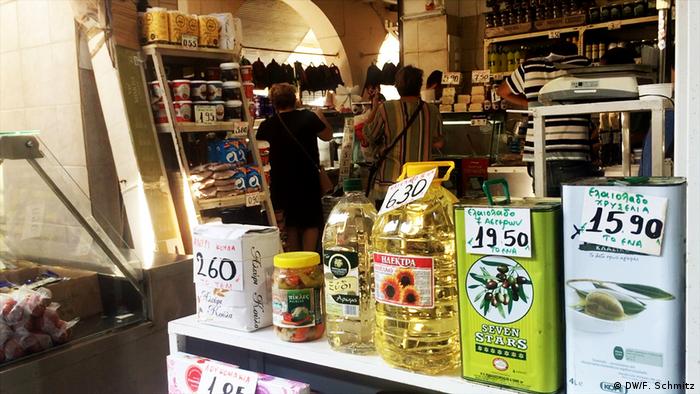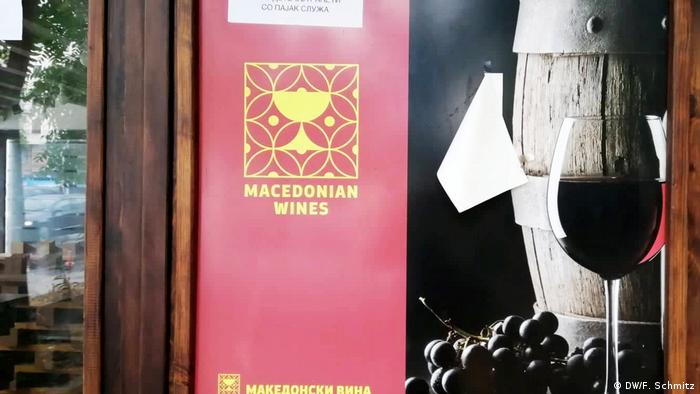The protected designation of origin “Macedonia” brings new conflicts between Athens and Skopje. Business representatives from both countries need to exercise in pragmatism.

Halva or Alva – Who has the right to the desserts-Original?
The Kapani market in the centre of Thessaloniki is located in the gourmet scene of the city. Here you can get all the products you is in Greece, proudly, cheese, wine, herbs and the famous Halvas, a mass of Oilseed, sugar and honey. Originally the Sweet comes from the Middle East. From there spread the recipe over the centuries, to present-day Greece and the Balkans.
North of the border, in the neighboring country North of Macedonia, is the name of the sugar product of Alva, and is also one of the culinary traditions. Many people in Greece see this as a competition. This is not healthy competition, but not infrequently also to the cultural prerogative. The 30-year-long name dispute, which was settled in 2018, the Prespa agreement, has created deep divisions between the two peoples. “You have no right to use the name Macedonia for their products,” complains a trader in Thessaloniki. For you Macedonian products remain Greek, even if you see in the case of Halvas no problems. Macedonians came to Greece, to buy the sugar food here. “They have not, however, establish the Knowledge, Halvas.”
There is little trust in politics
At barely 240 km away and Skopje, the capital of Northern Macedonia, one can only laugh at that. Of course you produce here, too, Alva, explained a young woman, even if the Greek version is sometimes better, as she admits, smiling. And the main problem child, the issue of denomination of origin is in any case a different product that is for both countries an important export commodity: Of wine.
“Macedonian wine comes from Macedonia, not from Greece,” pale a seller in the centre of Skopje. To change the name of your country to the Prespa agreement stops you for a crime: “North Macedonia does not exist. The us has been forced upon.” Not all Macedonians to think as radically as you. However, about a year after the signing of the agreement, the people have not come to terms on both sides of the border still with the new Situation. The reason for The deep mistrust in the policy.
After the former Greek Prime Minister Alexis Tsipras had to give not least because of the Macedonian question in the early elections in July, the house defeated, loses hold of the Macedonian government leader, Zoran Zaev significantly to return. He had lured the Macedonians with EU passports and so for the Prespa agreement is to be advertised. To join the Brussels Club but it’s still a long way to go.

Products come with the origin of drawing, Macedonia from Greece or from Northern Macedonia?
At the same time the North of Macedonia is currently shakes of a nasty blackmail scandal. The Macedonian Prosecutor Katica Janeva, which should be taken by the current government against organized crime, sits in pre-trial detention. In the process, Zaev had promised to start fighting corruption. That’s why many Macedonians doubt in the still ongoing implementation process of the Prespa agreement, whether you have set on the right horse.
Political ideology versus business pragmatics
Meanwhile, the new government in Athens has tightened the sound compared to the neighbouring country. The incumbent Prime Minister Kyriakos Mitsotakis had responded to a speech in the framework of the International trade fair in Thessaloniki at the beginning of September, the Problem of the designation of origin of Macedonian products, and in this respect, the Region in Northern Greece as “the true Macedonia” referred to. At the first Meeting with his counterpart from Skopje, on the sidelines of the UN Assembly in New York, he made it clear: “I would not have signed the Prespa agreement, but I’ll accept it.”
Much room he has not already. The Prespa agreement is ratified and committed both countries to comply with. Now it comes to the design of the implementation processes, also with regard to a solution of the designation of origin. “The politicians have done their job,” says Gjorgij Filipov from Skopje. He is the Vice-Chairman of an Expert Commission with representatives of both countries, as well as the office of the European Union intellectual property. You should advise the competent chambers of Commerce to find a solution to the labelling issue.
It is no longer going to be Private and not state property, therefore the negotiations were to be held at the political level: “We have called on both sides to come within the next three years an Agreement”. The task will not result in a single solution. It’ll go to various aspects, such as geographical indications to products, trade names, registered trademarks and brand names.

The main problem child in the brand competition in The Macedonian wine
It is important to overcome the ideological hurdles of the policy now. In other Parts of the world, you would have solved similar problems in a satisfactory way. “Business people are part of the real world and, perhaps, wiser than the politicians. You will find a solution.”
Competition to Prespa
So he may be right. Even now, trade between the two countries is flourishing. And many obstacles are also disposed of in terms of wine already. “According to the Prespa agreement and the name change to North Macedonia all the wine producers have changed their labels,” explains Elena Mladenovska Jelenkovic, Director of the Association ‘wines from Macedonia’. “Any wine bottle, which was labelled after the Change, also contributes to the new country name. You can’t be confused”. According to the agreements, both countries are likely to use the terms ‘Macedonia’ and ‘Macedonian’, as long as the country of origin was clearly marked.
Also on the Greek side, all of the wine producers are not to your reputation abroad. So far there is no problems in the market for Greek wines, says Fani Argyropoulou from the winery Pieria Eratini. Although it could lead abroad may be a source of confusion, but she believes in the market: “competition will make products better. And in Greece we are competing for areas with other wine-growing. Therefore, I believe that every producer should be unique in its own way”. The only way to protect yourself really from the difficult and confusing circumstances.